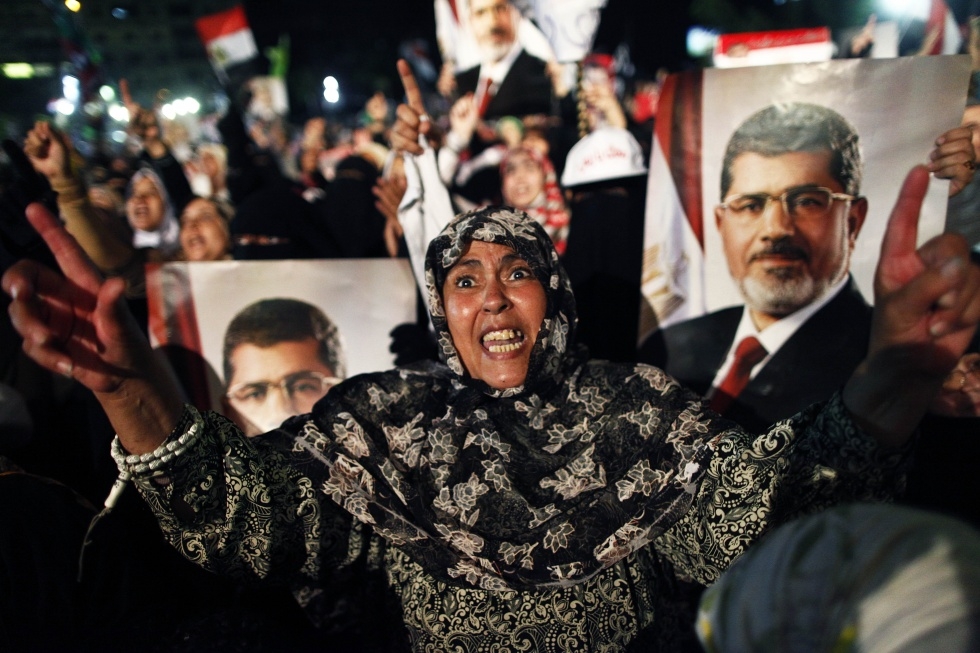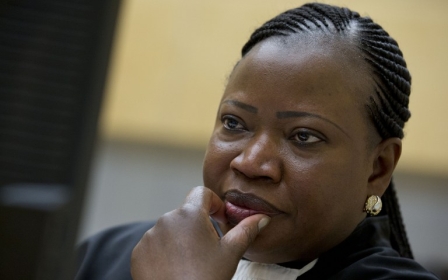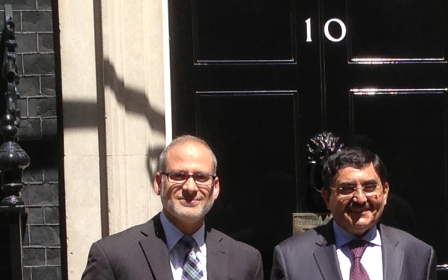Brotherhood steps up international legal battle against Egypt’s government

The Muslim Brotherhood has launched an international legal campaign to hold Egypt’s generals and ministers to criminal account for mass arrests, shootings, torture in custody, and show trials, the Middle East Eye can reveal.
Dossiers have been submitted to the Crown Prosecution Service in England, the International Criminal Court and the African Union, according to Lord Macdonald, the former director of public prosecutors and Liberal Democrat peer who is acting on the Brotherhood’s behalf in Egypt.
Lord Ken Macdonald told MEE that it was essential to end the impunity enjoyed by leading members of the military coup and the interim government: “The whole history of the development of international criminal law has been to end impunity.
“That’s the whole point of the International Criminal Court. It’s the whole point of the United Nations involvement in this area. It’s the whole point of crimes of universal jurisdiction, to undermine, to attack and to end impunity, and that’s why we, on behalf of the Muslim Brotherhood, have been engaged in a legal strategy entirely designed to hold to account the people responsible for these crimes.”
Lord Macdonald, former Director of Public Prosecutions (DPP), reacted with disdain to the decision of ICC prosecutor Fatou Bensouda to dismiss the application on the grounds that it was not made on behalf of the concerned state, which she leaked to journalists before informing the complainants themselves.
Bensouda argued that at the time President Mohamed Morsi signed the declaration to refer to the ICC, while the authority to do so was transferred to the people who were responsible for the coup.
The Liberal Democrat peer, who was once the third most powerful public prosecutor in England and Wales, said her decision was “casual, ill-considered, and had all the appearance of being drafted by bureaucrats rather than lawyers”.
“At the time President Mohamed Morsi signed the declaration, it was not yet clear who was in control and therefore the existing government was in control,” Lord Macdonald said. “We are perfectly satisfied that we have very strong legal authority for the position we adopted and we submitted it.” He has now mounted an appeal to the judges of the ICC themselves.
“I think it’s completely inappropriate for the ICC to respond in this casual, ill-considered way when a serious complaint has been issued about a regime, which is clearly involved in serious criminal activity, in respect of which there are literally thousands of victims, both people being killed and people being subject to outrageous, farcical trial procedures,” said Lord Macdonald. “It’s a very unhappy episode in the history of the ICC and we propose to challenge it."
Early progress
Lord Macdonald’s legal team says that it has made progress on the domestic front. Lord Macdonald was unable to comment in detail, but MEE understands that files concerning a number of Egyptians have been considered by the Crown Prosecution Service (CPS) and sent back to the police. This could mean that if any arrived in Britain, they might be liable to arrest.
As DPP Lord Macdonald was responsible for drawing up the National Protocol on War Crimes and Crimes Against Humanity. These govern how the counter-terrorism command division of the Metropolitan Police investigates serious international crimes and how the counter terrorism division of the CPS decides whether there will be a realistic prospect of conviction. This protocol has been amended since, but is still essentially in force.
Lord Macdonald said: “We are drawing the attention of the UK authorities to the law, to the existence of these crimes and to the evidence that many individuals have been complicit in these crimes and we are calling on the British authorities to enforce UK law. I don’t want to say more than that.”
In May, the Egyptian Minister for Industry and Trade, Mounir Fakhry Abdel Nour cancelled a visit to Britain at the last moment, as part of a high level delegation reportedly for fear that he might be arrested. His name was registered on a hotel booking in Knightsbridge.
The Brotherhood are now also fully engaged on talking to the UK government review of the Muslim Brotherhood, being conducted by Sir John Jenkins, the serving UK ambassador to Saudi Arabia.
Lord Macdonald said that from his conversations with the review team, they were “very keen” from the first point of contact to say they were conducting a review, not an investigation.
“My own view is that if you suspect that the Brotherhood were involved in physical acts of terrorism you, would not be conducting a review but an investigation,” he added.
At the time the review was announced, government sources were quoted as saying that MI6 would investigate claims of links between members of the Muslim Brotherhood in Britain and the bombing of a bus in the south Sinai in February in which three South Korean tourists were killed, along with the Egyptian driver.
A militant group called Ansar Beit al-Maqdis claimed responsibility for the attack. MEE understands that early on in the review, British intelligence discounted any link between the Brotherhood in Britain and this incident.
Lord Macdonald refused to speculate on the government’s motives for calling for a review and welcomed it as a chance for senior members of the Brotherhood to establish high level contacts and influence government policy.
“We have had very amicable and fruitful engagements with them and I don’t have any difficulty at all with the fact that the government have had the review and my clients have said to me they are very happy to engage with them.”
Tayab Ali, a partner of the ITN human rights law firm, who is part of the legal team, has also verified the change of direction.
“When [the Jenkins report] was announced, the government said it would investigate links between the Brotherhood and terrorism,” Ali said. “That was discounted at an early stage. The review has now become an important opportunity for senior figures in the Brotherhood to discuss and influence British government policy, particularly about Egypt."
Lord Macdonald added that neither Britain, nor the EU, had done enough to stand up for democracy in Egypt: “It’s a matter of regret that the UK and the EU did not do more to protect a democratic government that had been elected in what is universally acknowledged to have been a free and fair election. [It was] the first free and fair democratic election in Egyptian history, and the UK has been so quick to recognise and deal with the military backed government.”
New MEE newsletter: Jerusalem Dispatch
Sign up to get the latest insights and analysis on Israel-Palestine, alongside Turkey Unpacked and other MEE newsletters
Middle East Eye delivers independent and unrivalled coverage and analysis of the Middle East, North Africa and beyond. To learn more about republishing this content and the associated fees, please fill out this form. More about MEE can be found here.




